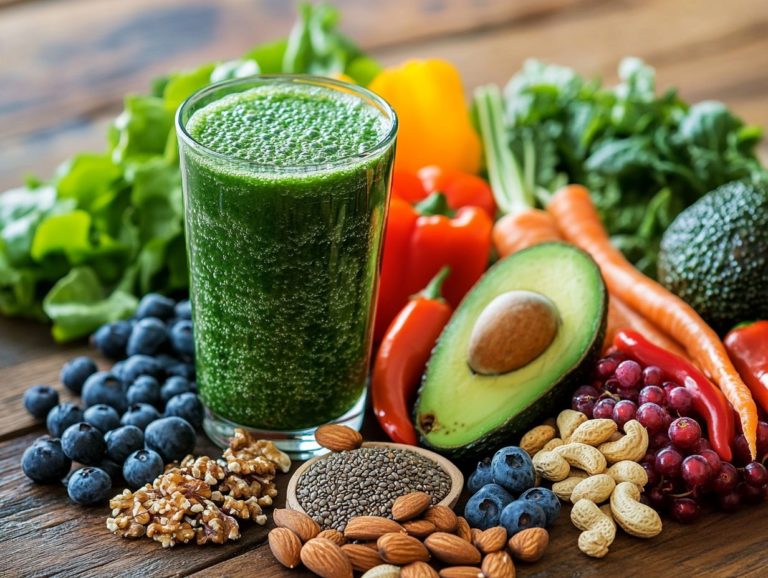How Nutrition Affects Your Mood
The intricate relationship between your gut and brain is more significant than you might realize. It impacts not just your physical health but also your emotional well-being.
Dive into the essential connection between nutrition and mood. Uncover how vital vitamins and minerals play an important role in regulating your emotions.
Explore nutrient-dense foods that can elevate your spirits, alongside those that may dampen them.
Discover practical tips to transform your diet into a powerful ally for enhancing your mental health.
Contents
Key Takeaways:

Nutrition plays a crucial role in regulating our mood through the gut-brain connection. Key nutrients such as vitamins, minerals, and omega-3 fatty acids are essential for maintaining a stable mood. Eating a diet rich in nutrient-dense foods and avoiding processed foods and excess sugar can dramatically boost your mental health!
The Gut-Brain Connection
The gut-brain connection profoundly influences your mental health and emotional well-being. This highlights the important role nutrition plays in your health journey.
Research indicates that your gut microbiome directly impacts brain function. This illustrates the intricate relationship between your food choices and psychological state.
This interconnectedness emphasizes the significance of your dietary patterns. They can either foster optimal well-being or contribute to cognitive decline and chronic inflammation.
Understanding the Relationship Between Nutrition and Mood
Understanding the connection between nutrition and mood is crucial. The foods you consume directly influence neurotransmitters like serotonin and dopamine.
This highlights how your food choices can help regulate your mood and minimize mood swings.
Incorporating nutrients such as omega-3 fatty acids, found in fatty fish, and B vitamins, prevalent in whole grains, plays an important role in synthesizing these neurotransmitters.
A diet rich in refined sugars and unhealthy fats can lead to dietary inflammation, potentially throwing off the balance of your mood-regulating chemicals.
If you re aiming to enhance your emotional stability, consider swapping out processed snacks for nutrient-dense options like nuts or fruits. These healthier choices provide the essential building blocks needed for serotonin and dopamine production.
Ultimately, making simple dietary adjustments can help you cultivate a more balanced emotional state, supporting your overall mental health.
Key Nutrients for Mood Regulation
Key nutrients are essential for regulating your mood. Certain vitamins and minerals significantly contribute to maintaining healthy brain function and emotional stability.
Incorporating nutrient-rich foods like omega-3 fatty acids, magnesium, and vitamin D into your diet is crucial for supporting neurotransmitter production and combating dietary inflammation.
Embracing these nutrients not only nourishes your body but also fosters a more balanced emotional landscape.
Vitamins, Minerals, and Other Essential Nutrients
Vitamins, minerals, and essential nutrients play a crucial role in maintaining emotional health. Omega-3 fatty acids and magnesium stand out as particularly beneficial for mood regulation and the prevention of mood disorders.
Adhering to dietary guidelines ensures you receive the proper balance of these vital nutrients. Incorporating a diverse array of foods rich in these essentials can significantly elevate your overall well-being.
For example, omega-3 fatty acids are plentiful in fatty fish like salmon and walnuts. Magnesium can be found in leafy greens, nuts, and whole grains.
The recommended daily allowances can vary. For adults, aiming for 250-500 mg of omega-3s and 310-420 mg of magnesium is advisable, depending on age and gender.
By prioritizing a balanced diet, you not only meet your nutritional needs but also promote better mental health, potentially alleviating symptoms of anxiety and depression.
Foods that Boost Mood

Incorporating mood-boosting foods into your diet is vital for enhancing your emotional well-being. Focus on nutrient-dense options like whole grains, legumes, and fermented foods to boost brain function.
The Mediterranean diet emphasizes these choices, promoting a balanced approach to nutrition.
Nutrient-Dense Foods to Incorporate into Your Diet
To enhance your mood, include nutrient-dense foods in your meals. Whole foods are packed with antioxidants and essential nutrients that support mental health.
Leafy greens, berries, and legumes fuel your body and lift your spirits. Adding colorful fruits and veggies like bell peppers and avocados amplifies these benefits.
These foods are rich in vitamins and minerals such as vitamin C and magnesium, known for fighting fatigue and stress. Imagine a vibrant salad with spinach, cherry tomatoes, and avocado it delights your palate and supports wellness!
Incorporate omega-3-rich foods like walnuts and fatty fish; don t overlook probiotics in yogurt and fermented items. These promote gut health, increasingly linked to mood regulation.
Blend these nutrient-dense foods into your daily meals to elevate your psychological and physical well-being effortlessly.
Foods that Can Negatively Impact Mood
Certain foods can harm your mood, especially processed items and those high in sugar. These often cause quick spikes in energy followed by significant mood swings.
Understanding these influences helps you make more informed choices for emotional well-being.
Processed Foods, Sugar, and Other Mood Disruptors
Processed foods and sugar disrupt mood by causing glucose fluctuations, leading to irritability and fatigue. Identifying these disruptors is essential for optimal mental health.
These ingredients can interfere with serotonin and dopamine, two key players in regulating emotions. As a result, you may face heightened anxiety and depressive symptoms. Replace these foods with nutrient-dense alternatives.
Whole foods like fruits, vegetables, lean proteins, and whole grains stabilize energy levels and improve mood. Mindful eating can further reduce reliance on processed options, allowing a balanced diet that supports physical and emotional health.
The Role of Nutrition in Mental Health
Nutrition is key for mental health, influencing conditions like depression and anxiety. This highlights the importance of lifestyle changes for better well-being.
A well-balanced diet can alleviate various symptoms by supporting neurotransmitter function and reducing inflammation.
How Diet Can Affect Conditions Like Depression and Anxiety

Your diet greatly impacts conditions like depression and anxiety. Nutrient-rich foods offer remarkable benefits and can improve mental well-being.
Recognizing dietary factors helps you make choices that alleviate symptoms. Research shows incorporating omega-3 fatty acids from fish like salmon and a variety of antioxidant-rich fruits and vegetables enhances mood and reduces anxiety.
Gut health is increasingly linked to mental well-being, emphasizing the importance of probiotics and fiber-rich foods for a healthy microbiome.
To uplift your mental state, swap processed snacks for whole grains, nuts, and seeds. This simple change can pave the way for emotional stability!
Practical Tips for Improving Mood Through Nutrition
Practical tips for enhancing your mood through nutrition can enable you to make healthier choices. It’s important to incorporate wholesome foods into your daily routine.
By making simple food swaps and embracing lifestyle changes, you can significantly elevate your emotional well-being and overall health.
Incorporating Healthy Foods into Your Daily Routine
Incorporating healthy foods into your daily routine requires intentional choices that prioritize healthy foods. This ensures your diet supports both mental health and emotional well-being.
One effective approach is preparing meals in advance. This saves you time and reduces the temptation to reach for less nutritious options. By dedicating just a few hours each week, you can prepare balanced meals and snacks so wholesome ingredients are always within reach.
This could involve chopping vegetables, cooking whole grains, or portioning out fruit for grab-and-go convenience.
Adding a variety of colors to your plate not only makes your meals visually appealing but also guarantees a diverse range of nutrients. Pair protein with healthy fats like avocados or nuts to enhance your satiety and energy balance, positively impacting your mental clarity and mood stability.
Frequently Asked Questions
What is the connection between nutrition and mood?
Nutrition plays a crucial role in regulating our mood through the production of neurotransmitters in the brain, such as serotonin and dopamine. These chemicals control our emotions, and the connection between nutrition and mental health shows that their production is influenced by the foods we eat.
How does a poor diet affect your mood?

A poor diet lacking essential nutrients, such as vitamins, minerals, and omega-3 fatty acids, can lead to imbalances in brain chemicals. This results in mood swings, irritability, and even depression and anxiety.
What are the best foods to improve mood?
Foods rich in omega-3 fatty acids, such as fatty fish, nuts, and seeds, improve mood and protect against depression. Whole grains, leafy greens, and lean proteins also positively impact mood and overall mental well-being.
How can nutrition help with managing stress?
A well-balanced diet with plenty of fruits, vegetables, and whole grains provides the necessary nutrients to combat the physical and mental effects of stress. Foods rich in antioxidants, like berries and dark chocolate, help reduce stress levels.
Can nutrition play a role in managing mental health disorders?
While nutrition alone cannot cure mental health disorders, it can significantly aid in managing symptoms and improving overall well-being. A healthy and varied diet supports brain function and mood, potentially reducing symptom severity.
How does hydration impact mood?
Dehydration can lead to fatigue, irritability, and poor concentration, negatively impacting mood. Staying hydrated by drinking enough water throughout the day helps maintain energy levels and improves overall mood.
Start by swapping out one unhealthy snack for a piece of fruit!






